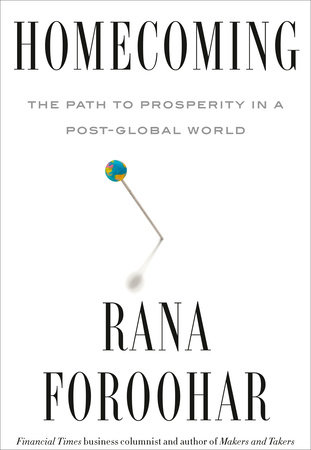Let’s Go back to Mercantilism and Trade Blocs!

Branko Milanovic warns that those who argue that the West should abandon globalization must explain such a move to the rest of the world.
I went to Rana Faroohar’s book party in New York tonight. Faroohar has a new and important book, “Homecomings” that dissects globalization as we know it and looks ahead. I have not read the book, and did not even ask Faroohar for a free copy (which were aplenty at the party tonight): the reason is that I know how authors struggle to write cute dedications in the midst of a party, and I did not feel like imposing this onto Faroohar. (In addition, I think I can afford to buy the book). But I have read her articles in the Financial Times, and was told at the party tonight that she had an important--programmatic—op-ed in today’s issue of the Financial Times. So I bought today’s FT. The link to Faroohar’s article is here.
Faroohar’s point is not new, but is told with unusual clarity and it comes at the right time. It is that the West should abandon globalization. Instead of it, the West should revert to trade blocs, in this case created between the nations sharing certain political values and geopolitical interests. It should use “friend-shoring”, the new term invented by Chrystia Freeland, the Canadian vice-Premier, whose recent talk at the Brookings Institution in Washington is quoted with approval by Rana Faroohar.
There are two reasons why the West should abandon globalization. The first is that it was not good, economically, for its middle classes. The “elephant graph”, originally produced by Christoph Lakner and myself, tells that story in a nutshell: the period of high globalization between 1988 and 2008, was good for Asian middle classes and the global top one-percent, but not for the Western middle classes. Second, geopolitically, globalization helped the rise of China which is already now, but will be even more so in the future, the main military and political competitor of the United States. China today accounts for 21% of global GDP vs America’s share of 16% while in 1988 the percentages were respectively 3.6% and 20%.
 Now, these two arguments do make perfect sense from the point of view of Western political interests why globalization should be scrapped in favor of regional blocs. The idea was, to the great but undeclared chagrin, of the American liberals first raised by Donald Trump. Now the liberals, in this respect like in several others, are happy to follow in Trump’s footsteps.
Now, these two arguments do make perfect sense from the point of view of Western political interests why globalization should be scrapped in favor of regional blocs. The idea was, to the great but undeclared chagrin, of the American liberals first raised by Donald Trump. Now the liberals, in this respect like in several others, are happy to follow in Trump’s footsteps.
The problem is how to explain this volte-face to the rest of the world. The Western narrative has, since 1945, been built precisely on the opposite view: open trade helps all the countries and it leads to peaceful coexistence. While one need not subscribe to the Montesquieu-Bloch-Doyle view of trade as an engine of peace, the economic arguments in favor of open trade were always strong. China and India and Indonesia and Vietnam and Bangladesh have made them even stronger.
Now, the West that was the principal ideological champion of free trade has soured on it because it no longer works in its favor. But whether it does or does not, is, from a global perspective, immaterial: the idea of open trade was not based on particular benefits to one side—as mercantilism was—but to the mutual benefits for most. The gains did not, ever, thought to involve absolutely everybody, but the idea was that the losing parties would be compensated domestically, or at least that their particular losses will not be allowed to derail the entire process.
We are now told that we need to go back to the drawing board. But we are not allowed to call these reversals by their real names. Their real name is trade blocs. They have existed before: there were called UK imperial preferences, Japan’s co-prosperity zone, Grosse Deutschland’s Central European area, Soviet Council for Mutual Economic Assistance. They also responded to geopolitical interests of the countries that introduced them. For some eighty years they were held to have been ideologically retrograde, part of “beggar-they-neighbor” quasi autarkic policies. Now, we are to believe that “friend-shoring” is somehow different. It is not. It just mercantilism under a new name and trade blocs in a different costume.
There is a further problem. The West was “in charge” of the dominant economic ideology. That ideology pervaded all international organizations. If the West is now going for “friend-shoring”, how is the IMF to explain to Egypt, Paraguay, Mali and Indonesia that they should continue with open trade? If globalization is (rightly) credited with raising incomes in Asia and with the greatest reduction in global poverty ever, are we now to reverse policies on global poverty and to argue that regional trade blocs should become the economic basis from which to proceed? Who is going to tell this to the IMF, the World Bank and the WTO?
If the West abandons globalization, this is fully understandable from the mercantilist perspective of national grandeur. Colbert would approve. But one should not delude himself/herself in believing that the rest of the world can just be flipped on the drop of the hat, and would not notice the enormity of the ideological change that this implies. And would not wonder if the initial impulse that advocated economic openness might not have been based on geopolitical concerns that are now found wanting.
One simply cannot maintain the universal validity of an ideology that one does not follow.
This first appeared on Branko's blog.
Photo by Tima Miroshnichenko


